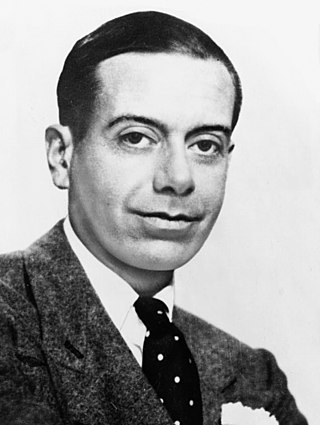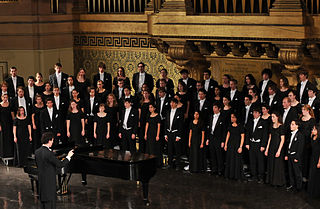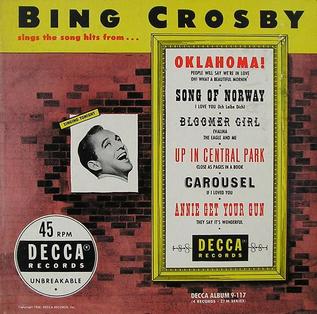
Collegiate a cappella ensembles are college-affiliated singing groups, primarily in the United States, and, increasingly, the United Kingdom and Ireland, that perform entirely without musical instruments. The groups are typically composed of, operated by, and directed by students. In the context of collegiate a cappella, the term a cappella typically also refers to the music genre performed by pop-centric student singing groups. Consequently, an ensemble that sings unaccompanied classical music may not be considered an a cappella group, even though technically it is performing a cappella.

"Let's Do It, Let's Fall in Love" (also known as "Let's Do It (Let's Fall in Love)" or simply "Let's Do It") is a popular song written in 1928 by Cole Porter. It was introduced in Porter's first Broadway success, the musical Paris (1928) by French chanteuse Irène Bordoni for whom Porter had written the musical as a starring vehicle.
"Lullaby of Broadway" is a popular song with music written by Harry Warren and lyrics by Al Dubin, published in 1935. The lyrics salute the nightlife of Broadway and its denizens, who "don't sleep tight until the dawn."

The Yale Glee Club is a mixed chorus of men and women, consisting of students of Yale University in New Haven, Connecticut. Founded in 1861, it is the third oldest collegiate chorus in the United States after the Harvard Glee Club, founded in 1858, and the University of Michigan Men's Glee Club, founded in 1859. The Glee Club performs several concerts each year in New Haven and goes on tour each January. According to music critic Zachary Woolfe of the New York Times, it is "one of the best collegiate singing ensembles, and one of the most adventurous." Its members are "world famous for their harmonic precision" per New York Times music critic Robert Sherman.

The Spizzwinks, stylized as The Spizzwinks(?), are an a cappella singing group of undergraduates from Yale University. Founded in late 1913, the Spizzwinks(?) are the oldest underclassman a cappella group in the United States, dating back to a first performance in early 1914.
The Princeton Nassoons are a ten to twenty-member low-voice a cappella group at Princeton University. The group has been officially self-selecting since 1941, although the original group is known to have sung together as early as 1939. The Nassoons are the oldest a cappella group at Princeton University.
"Don't Fence Me In" is a popular American song written in 1934, with music by Cole Porter and lyrics by Robert Fletcher and Cole Porter. Members of the Western Writers of America chose it as one of the Top 100 Western songs of all time.
"The Lady Is a Tramp" is a show tune from the 1937 Rodgers and Hart musical Babes in Arms, in which it was introduced by former child star Mitzi Green. This song is a spoof of New York high society and its strict etiquette and phony social pretensions. It has become a popular music standard.

"On the Banks of the Old Raritan" is a song, or alma mater, associated with Rutgers, The State University of New Jersey, in the United States. The original lyrics were written in 1873 by Howard Newton Fuller, an 1874 graduate of Rutgers College. Fuller quickly prepared the song as a school hymn for the college's Glee Club, an all-male choral ensemble, before a performance in Metuchen, New Jersey. Fuller chose to set the lyrics to the tune of melody, "On the Banks of the Old Dundee", a popular Scottish melody regarded as a drinking song, and titled the song for the Raritan River.
"I Love Paris" is a popular song written by Cole Porter and published in 1953. The song was introduced by Lilo in the role of La Mome in the musical Can-Can. A line in the song's lyrics inspired the title of the 1964 movie Paris When It Sizzles.

Mory's, known also as Mory's Temple Bar, is a private club adjacent to the campus of Yale University in New Haven, Connecticut, United States, founded in 1849 and housed in a clubhouse that was originally a private home built sometime before 1817. Originally it was a restaurant, especially hospitable to Yale undergraduates, located at the corner of Temple and Center Streets, but in 1912, when the building was to be demolished, the owner and proprietor, Louis Linder, sold it to a group of Yale alumni who moved the bar to 306 York Street and turned it into a membership club. The building was listed on the U.S. National Register of Historic Places in 2005.

Anything Goes is a 1936 American musical film directed by Lewis Milestone and starring Bing Crosby, Ethel Merman, Charles Ruggles and Ida Lupino. It is based on the 1934 stage musical Anything Goes by Guy Bolton and P. G. Wodehouse, which included songs by Cole Porter.
"I Love You, Samantha" is a song written by Cole Porter for the 1956 film High Society, where it was introduced by Bing Crosby.
"It's All Right with Me" is a popular song written by Cole Porter, for his 1953 musical Can-Can, where it was introduced by Peter Cookson as the character Judge Aristide Forestier.
In the British Army, a gentleman ranker is an enlisted soldier suited through education and social background to be a commissioned officer or indeed a former commissioned officer. Rudyard Kipling titled one of his poems, which was published in 1892, "Gentlemen-Rankers".
"Boola Boola" is a football song of Yale University. It has enjoyed widespread popularity over the years and has been adapted to many other uses. Despite its popularity, it is not Yale's official fight song, which is "Bull Dog", by Cole Porter.
Poor Little Lambs is a play by Paul Rudnick. It was first produced at the Theater at St. Peter's Church in the Citicorp Center in Manhattan, New York City, in 1982. The 1982 production, which featured David Naughton of An American Werewolf in London fame, is notable for including in its cast a number of young actors who were beginning to achieve, or later achieved, significant success in television or movies, including Kevin Bacon, Gedde Watanabe and Bronson Pinchot.

Anything Goes is a soundtrack album issued by Decca Records from the film of the same name. The film starred Bing Crosby, Donald O'Connor, Jeanmaire, and Mitzi Gaynor. Joseph J. Lilley was the musical director with special orchestral arrangements by Van Cleave. All the songs were written by Cole Porter with the exception of three additional songs from Jimmy Van Heusen (music) and Sammy Cahn (lyrics) which have been annotated in the listing below. The soundtrack recording took place between April and June 1955. Three songs were recorded in February 1956 with Joseph J. Lilley and his Orchestra for inclusion in the album to replace the original soundtrack versions.

Bing Crosby Sings the Song Hits from Broadway Shows is a Decca Records compilation 78rpm album of phonograph records by Bing Crosby featuring some of the hits from Broadway musicals.

Bing Crosby Sings Cole Porter Songs is a Decca Records studio 78rpm album of phonograph records by Bing Crosby featuring the songs of Cole Porter.













